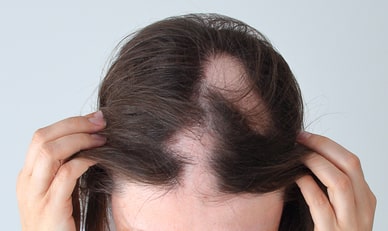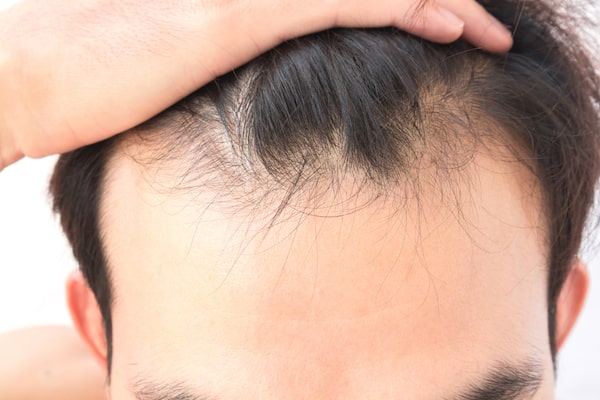Why are You Experiencing Hair Loss – Possible Causes
The loss of hair on the scalp can be quite alarming to anyone that starts to notice excess hair in the shower or on a pillow in the morning. In addition, the appearance of bald spots on the scalp can also cause a person to search for answers regarding the hair loss. While genetics can play a part in the loss of hair on the scalp, there are other hair loss causes that will need to be identified and treated by a board-certified doctor experienced in treating these conditions.
Here is a look at some of the most common hair loss causes and how they can be addressed by a doctor:
 Alopecia Areata is an autoimmune disease that can cause a loss of hair on any part of the skin. The hair loss is often seen as a patchy balding area that is normally round in shape. In general, the human body produces white blood cells and antibodies to protect itself against bacteria and viruses that are perceived to be foreign objects. Alopecia Areata means the hair follicles are perceived to be foreign by the white blood cells. In turn, this can cause the hair to fall out which results in the patchy balding areas on the scalp. There are multiple treatment options such as steroid injections to accelerate the recovery process and minoxidil or topical steroids that can be rubbed on the scalp to promote hair regrowth. Some doctors will suggest no treatment at all as the effects can often reverse on their own. If the condition expands and covers a large portion of the scalp, there can occasionally be permanent hair loss. Once the disease is no longer active on the scalp, a hair transplant can be considered. If the disease is still active, a hair transplant should not be performed as the transplanted hair can be lost due to the disease/mechanism that caused the hair loss in the first place.
Alopecia Areata is an autoimmune disease that can cause a loss of hair on any part of the skin. The hair loss is often seen as a patchy balding area that is normally round in shape. In general, the human body produces white blood cells and antibodies to protect itself against bacteria and viruses that are perceived to be foreign objects. Alopecia Areata means the hair follicles are perceived to be foreign by the white blood cells. In turn, this can cause the hair to fall out which results in the patchy balding areas on the scalp. There are multiple treatment options such as steroid injections to accelerate the recovery process and minoxidil or topical steroids that can be rubbed on the scalp to promote hair regrowth. Some doctors will suggest no treatment at all as the effects can often reverse on their own. If the condition expands and covers a large portion of the scalp, there can occasionally be permanent hair loss. Once the disease is no longer active on the scalp, a hair transplant can be considered. If the disease is still active, a hair transplant should not be performed as the transplanted hair can be lost due to the disease/mechanism that caused the hair loss in the first place.- Telogen Effluvium – This hair loss condition is the result of sudden stress experienced by the patient. If the body starts to experience an intense amount, or extended period, of physical or emotional stress, the body will stop performing functions it deems to be non-essential in order to preserve nutrients. Telogen is when the hair growth cycle begins to enter its resting phase. Telogen Effluvium is the hair loss process where stress causes a large number of hair roots to enter the resting stage prematurely. The results of the stress on the body will not be apparent right away as it can take some weeks or months for the results of Telogen Effluvium to become visible (thinning of the hair on the scalp and hair loss). Some common major stressors that can result in Telogen Effluvium include illness, surgery, pregnancy, thyroid dysfunction and psychological stressors such as a major life change. Thankfully, Telogen Effluvium normally does not require any type of treatment. The hair that is shed will normally be replaced by new hair that grows beneath them.
- Androgenetic Alopecia is a common form of hair loss that can impact both men and women. The cause is often genetics and is characterized by different features in male and female patients. Male patients see thinning hair start to occur at the crown of the head and the hairline can often recede and form a “M” shape. In female patients, the hair generally becomes thinner all over the scalp but the hairline does not always recede. There are multiple options for treating androgenetic alopecia and the most long-lasting option is a hair transplant. Hair follicles are harvested from a donor area on the body of the patient (usually the back and sides of the scalp) and transplanted to the balding area of the scalp. There are other treatments options such as Rogaine (a topical remedy that stimulates the hair follicles) and Propecia (a prescription medicine used to treat hair loss that occurs in the middle of the scalp or at the crown).
- Hairstyles that pull on the hair on the scalp, such as ponytails, for a continuous period of time, can result in hair loss in certain areas of the scalp. This condition is known as Traction Alopecia and it occurs due to the act of constantly pulling on the hair. The result is hair loss in the area that is constantly being pulled and even some scarring. In order to treat this condition, patients can try wearing another hairstyle or, in some cases, topical minoxidil can help to reverse the damage.

Hair Loss – Contact Us Today
If you are experiencing hair loss, please contact our office to schedule a consultation appointment. The determination of why the hair loss is occurring is a key element of successfully treating the issue. Our team of experienced, board-certified Los Angeles and San Francisco hair transplant surgeons will perform a through medical examination of your scalp in order to determine the reason for the hair loss along with the best treatment option for the condition.
– MA